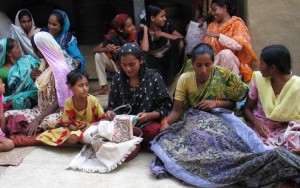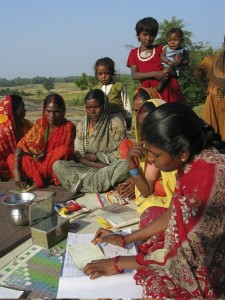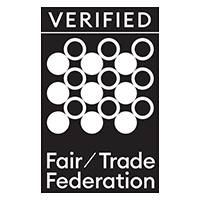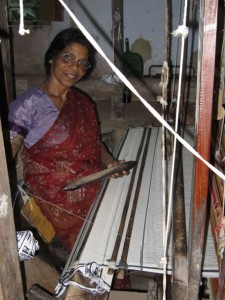Art, Artisanship and Fair Trade

Group of Artisans and family members embroidering for retail and wholesale scarves collection by Sevya
There is a very useful distinction to be made between Western notions of art and Eastern notions of the artisan. As we all know quite well, Western cultures we place a great deal of importance on the individual. Most cultural discourse feeds the notion that the self is a bounded entity. Our daily lives are saturated with limitless reinforcements of the notion that our lives are essentially individualized—that everything of importance comes from the individual. In conventional discourse, Western artists are the inspired individuals who dare to make public their risk-taking, people who defy the norm by “falling on their faces” in public. The idea is usually to generate insights through revealing a particular perspective, a view from one person living in a particular time and place. Personally, I have no problem with this.
Van Gogh has touched me through his bold and defiant works, and I look for such masterful plays against conformity when I view visual art. Joni Mitchell’s lyrics and musical voice draws me into instant connection with her experience, and through that connection I connect to my own experience. Occasionally I come across an artist who speaks out for many people who are struggling, one who does it so well that they can actually help along a shift in consciousness. Since music is my passion I think of the importance of artists like Stevie Wonder, Aretha Franklin and Curtis Mayfield, who had a huge impact on the Civil Rights Movement. They chose to reveal their perspectives in a way that not only connected to others but put this connection into use in extremely powerful ways.
There is another notion of art that is quite different, and can be also be a powerful force for good in the world. In Eastern traditions we find that art is not about revealing an individual perspective; rather, traditional art in the East has been about revealing and reinforcing a community, a network of relationships. Many of the most beautiful and culturally important works of Eastern art are products of entire communities. We have countless examples of Eastern art where individual artists were never recorded. The focus was on the cultural importance of the art and not the individual perspective of the artist.
A modern example I find particularly resonant is the artisanship found in the production of fair trade retail and wholesale scarves. Entire communities are involved in the production of finely woven, exquisitely crafted, practical works of art. No individual’s name appears on the tag. Instead, one reads something about membership in a particular fair trade organization. This simple statement means a great deal. Because belonging to such an organization means that the welfare of the entire community is being looked after. Specifically, the nine principles agreed to by the World Fair Trade Organization are strictly upheld, ensuring that entire communities are given real opportunities that lead to long term sustainability, health and happiness.
Sevya is proud to promote the artisanship of entire communities. We are overjoyed that our scarves, jewelry, décor and other works are sold in ways that bring much needed revenue back to communities of artisans. We would love to share the love embodied in these wonderful items with you and yours. The tags on many of our items say, “Handmade with love in India.” By this we mean that whole communities lovingly attend to the work that goes into the scarves, textiles, or other works. The statement made comes from a collective heart. This is followed by the statement, “Member of the Fair Trade Federation.” This statement is meant to ensure our customers of our integrity. The communities that produce these items do benefit very much from your purchases.

Artisan Women's Self Help Group. Sevya promotes sustainability for Cooperative Groups through sales of fair trade clothing, retail and wholesale scarves, etc.
On the back of these tags there is another statement: “Sevya is dedicated to preserving ancient art forms by supporting the artisan communities who uphold these traditions.” You will not find an individual artist’s name on each piece. What you will find is a work of art that springs from a wide network of relationships—a community. And this community is taking part in a progressive process of empowerment. The sale of these items in the retail and wholesale fair trade market ensures the long term sustainability of these artisan communities. The final statement on the tag is that “Each piece is handmade by artisans in India; a work of art made with the finest natural materials.” What you are purchasing, you see, is much more than the work of an individual artist. We invite you to support these efforts and promote positive change in our world.
Jerry Rasch writes for Sevya as a part time, but full-hearted passion.


